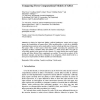586 search results - page 1 / 118 » Comparing Three Computational Models of Affect |
PAAMS
2010
Springer
13 years 9 months ago
2010
Springer
In aiming for behavioral fidelity, artificial intelligence cannot and no longer ignores the formalization of human affect. Affect modeling plays a vital role in faithfully simulati...
CVPR
2004
IEEE
14 years 6 months ago
2004
IEEE
Recognition difficulty is statistically linked to ??? subject covariate factors such as age and gender for three face recognition algorithms: principle components analysis, an int...
BMCBI
2007
13 years 4 months ago
2007
Background: Although testing for simultaneous divergence (vicariance) across different population-pairs that span the same barrier to gene flow is of central importance to evoluti...
ACII
2011
Springer
12 years 4 months ago
2011
Springer
Current approaches to story generation do not utilize models of human affect to create stories with dramatic arc, suspense, and surprise. This paper describes current and future wo...
EICS
2009
ACM
13 years 8 months ago
2009
ACM
This paper presents an approach for investigating in a predictive way potential disruptive effects of interruptions on task performance in a multitasking environment. The approach...

